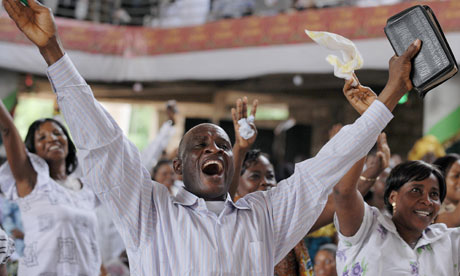
Churches ready to resume activities as they offer safety protocols on COVID-19
Heads of Christian Ecumenical Bodies in Ghana have expressed their preparedness to resume activities, as they put together a proposal for the government to clearly spell out modalities under which they can safely perform their programmes without endangering the lives of congregants.
The proposal is a follow up to a meeting between President Nana Addo Dankwa Akufo-Addo and leaders of the Christian faith at the Jubilee House on April 21, 2020.
Advertisement
The proposal, a copy of which was sighted by the Daily Graphic, is advocating strict adherence to all prescribed precautionary etiquettes against the coronavirus disease (COVID-19), including providing separate seating areas for the aged.
It is to be jointly presented by the Chairman of the Christian Council of Ghana (CCG), the Most Rev. Dr Paul Boafo; the President of the Ghana Pentecostal and Charismatic Council (GPCC), Rev. Prof. Yaw Frimpong-Manso; the President of the Ghana Catholic Bishops Conference (GCBC), the Most Rev. Phillip Naameh, and the President of the National Association of Charismatic and Christian Churches (NACCC), Archbishop Nicholas Duncan-Williams.
Proposal
The proposal identifies some risk areas for the spread of the virus and proffers solutions to mitigate them.
The areas include entry points to churches, such as doors and door handles, rails and pillars, and seating arrangements in the churches.
The churches have expressed their commitment in the proposal to ensure that services such as offertory, communion and giving or receiving offering and tithes are carried out in line with the safety protocols.
They have further offered to form COVID-19 response teams in their respective churches, in addition to stepping up education on the pandemic by engaging members and people within their environs.
Reaction
Opinions over the possible resumption of religious activities are, however, divided.
Reacting to a question on the subject on social media platforms, some respondents said they would only attend church services if logistics needed to observe the protocols were provided to ensure their safety.
“If the markets are open for business, why can’t we go to church? I will go if the ban is lifted, but the church must make provision for adherence to the protocols, such as handwashing at vantage points within the church premises, ensuring that people obey physical distancing and, more importantly, they wear their nose masks,” Madam Yaa Benewaa Ofori, a Presbyterian, said.
Kofi Ansah Mensah, a Methodist, said he was ready to attend church should the ban be lifted today because before the ban, his church had discussed the possibility of holding services with smaller congregants.
Eno Bruwaa Agyeman, an usher at a charismatic church, also said she and her colleagues were eagerly looking forward to the lifting of the ban, saying: “I don’t believe there is anything to fear if we all go by the safety protocols. After all, since the restrictions on movement was lifted, we go to work and the markets.”
Madam Yaa Boahemaa Boateng of the Church of Pentecost said she was not too sure if she would want to go to church immediately if the ban was lifted, for the reason that she felt uncomfortable having the nose mask on for more than an hour.
“So I will stay away and only go when I would not need to wear the mask. After all, these past six weeks have proved that the church is in our hearts and not in the building,” she said.
A young couple, Mr and Mrs Oteng-Brobbey, expressed concern over how safe children’s service would be, adding: “If there is assurance that it will be safe for our children to go to Children’s Sunday School or for them to be with us at the main auditorium, fine; if not, we don’t think we will be going to church soon.”
Muslims
Some Muslims too indicated their preparedness to go to the mosque if the ban was lifted, since measures would be put in place to ensure the safety of worshippers.
“At this point, we all are aware of the risks and safety protocols. I will be at the mosque to worship once I’m assured of the safety protocols in place, particularly the observation of physical distancing.
“We are not in normal times and so we should understand that we will have to pray without touching one another, as is usually done,” Zakaria Ali said.
“With regard to the washing of hands, we do that through the observance of ablution before each prayer time. At the moment, some of us have included the use of soap, instead of just water. What will be challenging is the physical distancing — as we have specific times to pray, the space in the mosque does not allow for adequate physical distancing. Perhaps many would opt to be outside to pray,” Abdul Malik Aziz said.
Background
A ban was placed on all public, social and religious gatherings by President Akufo-Addo on March 15, as part of measures to curb the spread of the coronavirus disease.
When he extended the ban, the President said there was a unanimous decision with the leaders of the major interest groups that it was early to lift it.
However, in preparation for the eventual lifting of the ban, the leaders of the Christian Ecumenical Bodies have presented the proposal.aa




